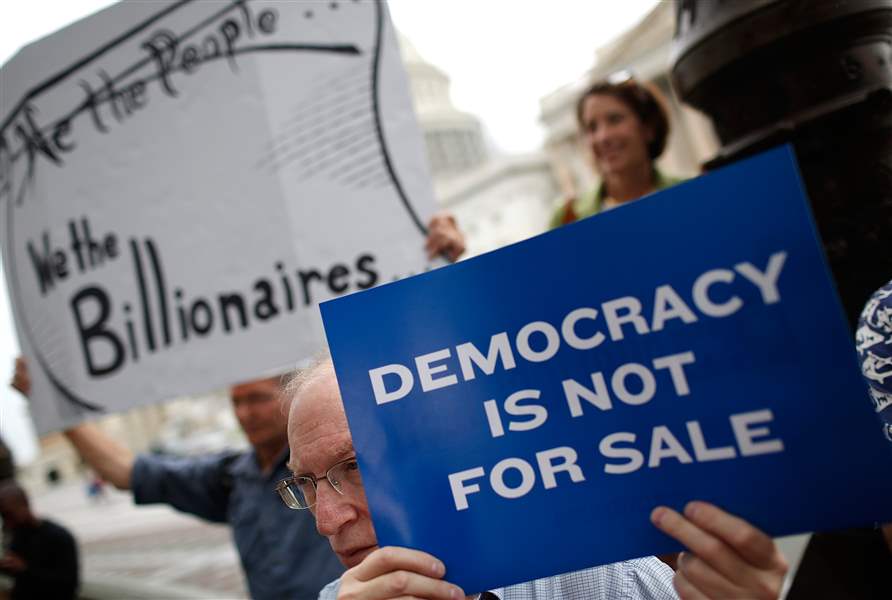
Anti-corruption reforms are a winning strategy
8/24/2018
Supporters of campaign finance demonstrate outside the U.S. Capitol on Sept, 8, 2014, in Washington, D.C.
Getty Images/Win McNamee

Will Tomer
Back in 2016, when President Donald Trump was candidate Trump, he boasted that if elected, he would surround himself “only with the best and most serious people.” He also pledged to “drain the swamp” and eradicate corruption from U.S. federal politics.
There have been more pieces written about the flimsiness of these claims than I’d care to count. And with the recent conviction of Paul Manafort, Mr. Trump’s former campaign manager, and the guilty plea of Michael Cohen, Mr. Trump’s former personal attorney, yet another deluge of think-pieces is certain to emerge.
But rather than using this as yet another opportunity to mock Mr. Trump, Democrats would be wise to recognize that many Americans remain deeply frustrated with the corruption in our nation’s politics — a corruption to which Mr. Trump’s cohorts have undoubtedly added — and anti-corruption reforms will almost certainly be a winning cause.
An aversion to corruption is rooted in the origins of the United States. The revolutionaries who waged war for their freedom did so because the British government that ruled them was overwhelmingly corrupt.
But corruption plagues virtually all institutions and American politics has faced its fair share of shady characters and scandals. Names and incidents like Jack Abramoff, Charles Keating, Teapot Dome, and Watergate are synonymous with unethical politics and illicit behavior.
Suspicions about corruption and distrust of our federal government remains steady. In 2015, Gallup released a poll which found that 75 percent of Americans believe there is widespread corruption in U.S. government. And that fear of corruption in U.S. politics may still be growing.
A December, 2017, survey taken by Transparency International found that nearly six in 10 Americans believed that corruption in U.S. government had increased during 2017.
Mr. Trump sailed this sea of discontent into the White House, promising that his unorthodox approach would clean up the system that frustrated so many. But as his associates are dragged into court on charges of corruption and fraud, Democrats have been presented with an especially good opportunity to pitch their own solutions.
This past Tuesday, the same day that Manafort and Cohen were convicted of various campaign finance violations and frauds, Sen. Elizabeth Warren (D., Mass.) unveiled a set of anti-corruption reforms. Ryan Grim of the Intercept noted that “if just half of [Ms. Warren’s proposals] were implemented, it could transform the political economy of Washington and fundamentally upend the lawmaking process as it currently exists”
Among other things, Ms. Warren wants to ban elected officials from lobbying for life, restrict stock ownership by lawmakers and cabinet secretaries, prohibit U.S. citizens from lobbying on behalf of foreign governments and companies, and mandate that the Internal Revenue Service release tax returns for political candidates.
During her remarks, Ms. Warren highlighted the distrust of many Americans in their government. “This is the kind of crisis that leads people to turn away from democracy,” she said. “The kind of crisis that creates fertile ground for cynicism and discouragement. The kind of crisis that gives rise to authoritarians.”
Ms. Warren’s announcement followed hard on the heels of several other prominent anti-corruption proposals from other Democrats.
Rep. John Sarbans (D., Md.) helped develop the “Better Deal for Democracy” program, which includes pledges “fight special interests” and “combat big money influence” in politics.
Meanwhile, Sen. Bernie Sanders (I., Vt.) has sparked a new wave of Democratic candidates who have pledged to not take money from corporate political action committees. More than 170 candidates have said they will not accept such donations, a list which includes seven sitting U.S. senators — Mr. Sanders, Ms. Warren, Kirsten Gillibrand (D., N.Y.), Cory Booker (D., N.J.), Kamala Harris (D., Calif.), Maria Cantwell (D., Wash.), and Sheldon Whitehouse (D., R.I.).
(Of those seven, Mr. Sanders, Ms. Warren, Ms. Gillibrand, Mr. Booker, and Ms. Harris are all believed to be presidential hopefuls in 2020.)
The anti-corruption message is one that clearly resonates with Americans, and Democrats have a clear window of opportunity, thrown wide open by Mr. Trump and his cronies, to deal successfully with government corruption.
But Democrats must be sure to follow through on proposed reforms.
It is easy to point to the party in control and claim it is corrupt. The Democrats did this during George W. Bush’s administration and then, after taking control of Congress and the White House in 2008, failed to enact meaningful reforms to protect the integrity of government or campaign finance.
If the Democrats do, in fact, enjoy a so-called “blue wave” this November, their success in the longer term will depend in large measure on the extent to which they fulfill their promises to rid the federal government of corruption.
Practically all Americans, regardless of political affiliation, want to see politics free from corruption, but they’ve been burned many times before, by the current president and many of his recent predecessors. Failing to honor yet another set of promises could have devastating effects, not only for Democrats but for our political system as a whole.
Contact Will Tomer at wtomer@theblade.com, 419-724-6404, or on Twitter @WillTomer.